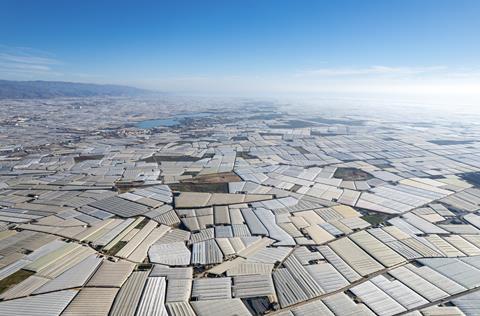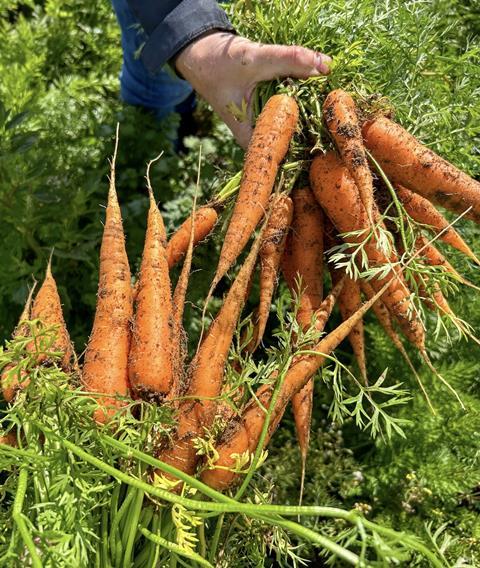The UK’s dependence on the Mediterranean leaves it vulnerable to the impact of increasingly frequent weather extremes to hit the region, including the devastating floods in southern Spain

The UK’s reliance on Spain for imports of fruit and vegetables is common knowledge, the southeastern region of Murcia being branded the Garden of Europe for good reason. Almost a quarter of the vegetables imported by the UK come from Spain, including key items like tomatoes, peppers and cucumbers. For products such as lettuce, that figure rises to a whopping 80 per cent.
Which is why weather extremes in Spain and the growing impact of climate change in the Mediterranean are of great interest to UK suppliers and retailers. One third of UK fruit and vegetables is estimated to be imported from climate-vulnerable countries – and this fraction is on the rise, according to a study in Nature Food.
The contribution of domestic production to total fruit and vegetable supply in the UK decreased from 42 per cent in 1987 to 22 per cent in 2013, according to research from Pauline FD Scheelbeek, increasing the reliance on imports from climate-vulnerable countries, with negative consequences for availability, price and consumption.
“Inter-sectoral actions across agriculture, health, environment and trade are critical in both the UK and countries that export to the UK to increase the resilience of the food system and support population health,” the study stated.
The problem is, all this has been known for years. This particular study is from five years ago.
A new reliance?
Morocco has increasingly become a key supplier for the UK market, especially for items like tomatoes, reducing the burden on Spain. But Morocco is also vulnerable.
“Climate change presents serious challenges for Moroccan tomato production, with projections indicating potential yield reductions due to rising temperatures and increasing water scarcity,” says Fatiha Charrat, deputy general director of Delassus. “Morocco has already endured seven consecutive years of drought, which would have severely impacted production in the Agadir region if the government had not made significant investments in seawater desalination.”
Today, she says, around 40 per cent of the region’s water needs are met by the Souss desalination plant. However, desalinated water costs three times more than well water, Charrat points out, adding a significant financial burden for growers.
Of course, the occasionally empty shelves of salads and other vegetables seen in recent years were due in large part to simultaneous climatic issues in both Spain and Morocco.

“Nearly 12 months ago in the UK, there was a massive shortage in salads,” says Jim Jefcoate, UK director of Food Experts in Spain. “It was caused by very poor weather in Morocco and also in southeastern Spain. But there were a number of reasons for this. One was Brexit, so there were a lot of pressures, a lot of headwinds in the supply chain. Another was that the UK retailers tend to have a very rigid or inflexible approach to programming, so they weren’t able to accommodate the shortage.
“But for me, there’s another issue, which is when a product goes short, there is a whole burden of compliance in the UK that isn’t in other parts of Europe or the world, so I think that was a big contributory factor to why there were so many empty shelves in the UK.”
Silver linings
The key takeaway from last autumn’s Spain Food Nation Summit was that the UK’s reliance on Spain was unlikely to change any time soon. “The UK needs Spain, and Spain needs the UK” was the event’s chief message. Just over a month later, deadly floods wiped out huge volumes of Spanish produce destined for the UK market.
A government-led drive to boost domestic production seemed unlikely given the apparent return to austerity in the UK, but UK producers have shown they can take advantage when extreme weather hits the Mediterranean.
“The flooding in Spain affected most crops we import from over there,” says Tim O’Malley of Nationwide Produce. “Supply tightened and prices increased. However, every cloud… We import a lot of carrots from Spain at the back end of the UK season. Out of the blue, in early March, our Spanish carrot suppliers were contacting us looking to buy UK carrots. That’s never happened before so early in the season.”

Of course, it’s hard to depend on such random events, but it goes to show what opportunities exist. “It started suddenly and it ended suddenly,” says O’Malley. “As soon as the weather dried up, they put the brakes on, but by then, over a three-week period, we’d exported 56 loads. We rarely export carrots to Spain. It only ever happens when they have weather issues and usually only a few loads to get them out of trouble. We’ve never exported anything like this many. With the carrot market in the UK oversupplied this season, we welcomed the orders with open arms, as did our growers.”
As Donald Trump’s recent trade wars have shown, having multiple sources of supply is always a sensible strategy, but food security really has to start at home, and the UK government has at least signalled some willingness to invest.
Three special funds, worth a combined £45.6mn, are set to support multiple projects across the research and development lifecycle – “from robots carrying out delicate fruit picking, right through to variable irrigation systems to maximise water usage on crops” – in a bid to strengthen food security, increase farmers’ profits and protect nature as part of the government’s Plan for Change.
“This government is serious about delivering its Plan for Change,” said farming minister Daniel Zeichner. “That is why I’m delighted to see money getting out the door to British farmers. This £45m will support them with technology to boost food production, profits and the rural economy.”



